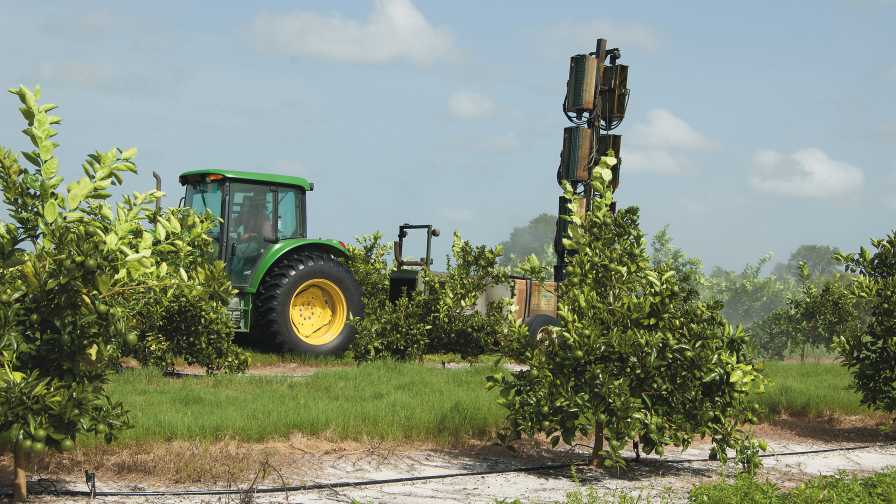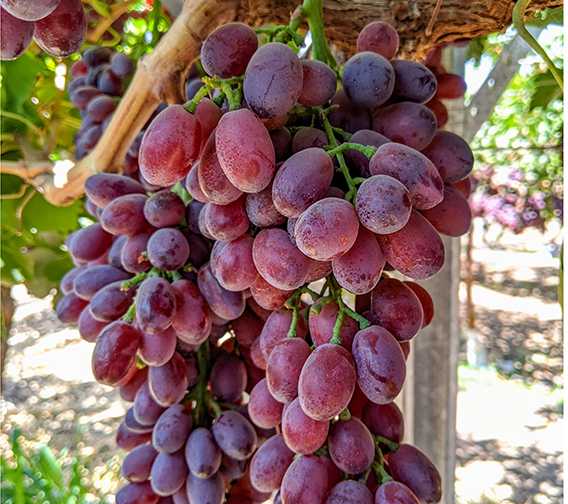How Florida Growers are Taking the Fight to Citrus Psyllids

Some citrus growers have modified their psyllid management program, focusing on softer chemistries, and they are seeing reduced pest counts.
Photo by Frank Giles
During the past few years, Asian citrus psyllid (ACP) populations were running high, with insecticide applications making little difference in curbing overall counts of the pest. It soon became evident that the HLB vector was developing resistance to certain chemicals, and there were little to no beneficial insect populations in most groves to help in the fight.
ACP counts got to the point where some growers decided to cut back their insecticide programs significantly because they didn’t appear to be making a dent in the pest’s presence in groves. It also was not economically feasible for some growers to be making upwards of 12 psyllid control applications per season.
Soft Focus
Jim Snively, Production Manager for Southern Gardens Citrus, says the situation was cause to reevaluate their ACP-control approach. That assessment didn’t call for a significantly reduced application program, but it did call for a change.
“There were a couple of years where it didn’t seem to matter what we did; we were not getting any control of ACP populations,” Snively says. “So, we got with Dr. Phil Stansly (the Entomologist with UF/IFAS sadly passed away in 2018) who came out to our groves and got samples of our ACP and tested for resistance.”
The results came back last spring and showed positive for resistance to imidacloprid and some of the organophosphates. Snively says when they got the results of the tests, their ACP populations were as high as they had been in the past two to three years.
“That is when we changed our program,” he says. “Fast forward to today, and we are seeing the lowest ACP populations in our groves than we have seen in about three years.”
What did they do? “I like to say we laid off the hard stuff,” Snively says. “We backed off applying pyrethroids and organophosphates and moved to softer chemistries. These products are more expensive, but it has allowed us to go from making 12 applications per year to around eight.”
Snively says the softer materials are a good rotation for resistance management, and they also have allowed beneficial insect populations to rebound and help in ACP control.
“All of the materials we have are not good enough to work alone, so we have to have beneficials for everything to work properly,” he says. “That is not just for ACP; it is for rust mites, spider mites, and fungal diseases — all of it. We scout our blocks every two weeks, and ACP counts are way down with this new program.”
Timing
In January, Snively applies their dormant ACP sprays. While they are limiting pyrethroids, he says this is a good time to use them and applies Danitol (fenpropathrin, Valent). In February, pre-bloom applications include Movento (spirotetramat, Bayer).
“In the March/April timeframe, we will come in with our post-bloom spray with a second Movento application or go with our first Exirel (cyantraniliprole, FMC), depending where the bloom is,” Snively says.
In May, summer sprays will commence with an application of Exirel or Minecto Pro (cyantraniliprole, abamectin, Syngenta), if mites are beginning to show up.
“With our second summer spray in July, we might apply an organophosphate, but more than likely we will come in with Delegate (spinetoram, Corteva). Last year, we applied Intrepid Edge (methoxyfenozide, spinetoram, Corteva) to control ACP and other pests.
“In September/October, we will apply Portal (fenpyroximate, Nichino America) for ACP and rust mite control. Then we will not apply anything until we get back to dormant sprays in January, unless scouting tells us we need to spray.”
Conserving Neonics
Neonicotinoids have been recognized as the foundation for ACP control in young trees. Imidacloprid has shown the most alarming levels of resistance in trials throughout the state. In response, Snively has adjusted how the products are used on the farm.
“Before we confirmed resistance, we were applying Admire Pro (imidacloprid, Bayer) every six weeks until we maxed out per the label,” Snively says. “After that, we moved to Belay (clothianidin, Valent USA) and Platinum (thiamethoxam, Syngenta).”
With the amount of resistance showing up with imidacloprid (tests were not conducted for Belay and Platinum), Snively has backed off on applications from nine per year to four. Those applications include two with Admire Pro and Belay and Platinum rotated in the other two applications.
“These changes so far have made a big difference on our farm, and I hear from a lot of other growers who are applying a similar approach in their ACP programs and having success,” Snively says.










